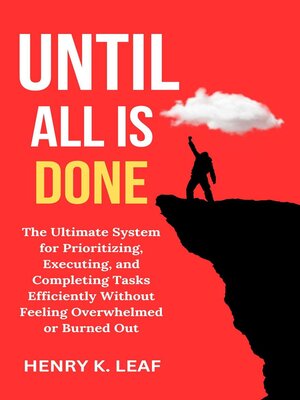Until All Is Done
ebook ∣ The Ultimate System for Prioritizing, Executing, and Completing Tasks Efficiently Without Feeling Overwhelmed or Burned Out
By Henry K. Leaf

Sign up to save your library
With an OverDrive account, you can save your favorite libraries for at-a-glance information about availability. Find out more about OverDrive accounts.
Find this title in Libby, the library reading app by OverDrive.



Search for a digital library with this title
Title found at these libraries:
| Library Name | Distance |
|---|---|
| Loading... |
Distractions pile up, deadlines creep closer, and the to-do list never seems to shrink. Every day feels like a race against time, yet no matter how much effort is poured into work, the feeling of being behind never goes away. The traditional approach to productivity—working harder, pushing through exhaustion, and sacrificing personal well-being—is failing. Efficiency isn't about doing more in less time. It's about doing the right things, at the right moments, in the right way.
Overcommitment leads to burnout. Multitasking creates inefficiencies. Constantly switching between urgent tasks and important priorities drains mental energy. The key to mastering productivity lies in developing a system that eliminates unnecessary decision-making, minimizes wasted effort, and ensures tasks get completed without the exhaustion that comes from constantly feeling behind. A structured, repeatable method for organizing tasks and executing them with precision removes the mental clutter that slows progress and leads to frustration.
Without a clear system, priorities blur together. The important gets overshadowed by the urgent, and meaningful progress is lost in the chaos of everyday demands. By strategically categorizing tasks based on their true impact rather than their perceived urgency, decisions become effortless, execution becomes focused, and efficiency improves without increasing effort. The mind functions at its best when it is free from constant stress. A well-designed workflow removes the need for willpower and discipline by turning productivity into a habit rather than a struggle.
The common approach to productivity relies on motivation, but motivation is unreliable. Energy levels fluctuate, focus wavers, and external pressures often dictate what gets done. A system removes the guesswork, ensuring that progress continues even when motivation is low. The most successful individuals do not rely on feeling inspired to take action. They use structured methods that keep them moving forward, regardless of circumstances.
The real cause of burnout isn't the workload—it's the lack of clarity. Unfinished tasks create mental weight, leading to exhaustion before the work is even started. Completing work efficiently isn't about working faster; it's about eliminating unnecessary steps, reducing the cognitive burden, and streamlining the execution process. Task completion should feel satisfying, not draining. A well-designed system ensures that each completed task moves the bigger picture forward, rather than simply reducing the number of unchecked boxes.
Productivity isn't about getting everything done—it's about getting the right things done in a way that sustains long-term progress. The mind works best when it is not overloaded. A structured, repeatable approach eliminates decision fatigue, prevents burnout, and keeps momentum strong. Readers will walk away with a clear system for prioritizing, executing, and finishing tasks efficiently—without feeling overwhelmed or overworked.







